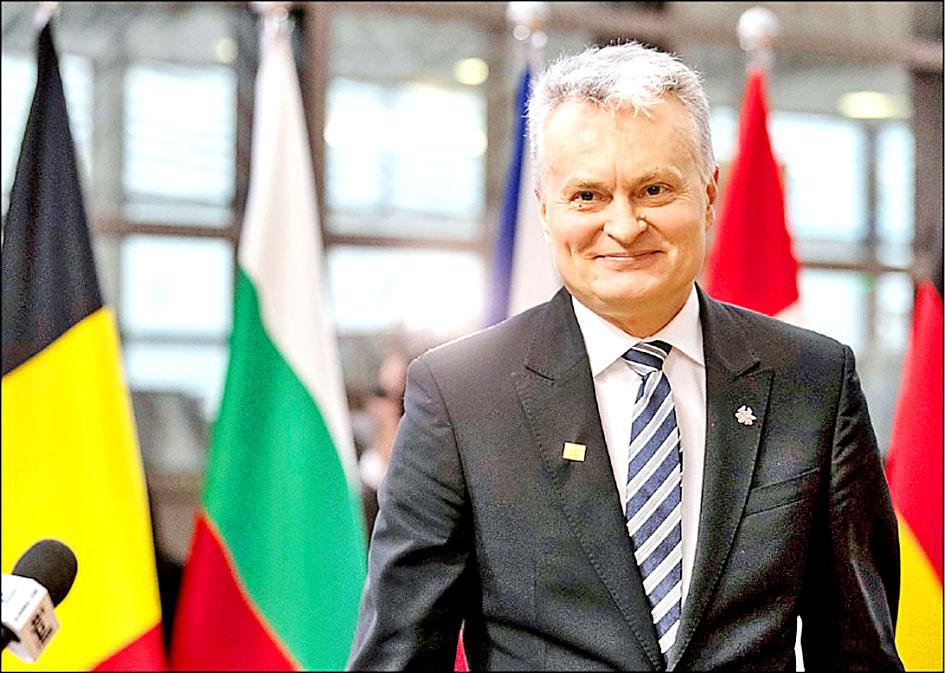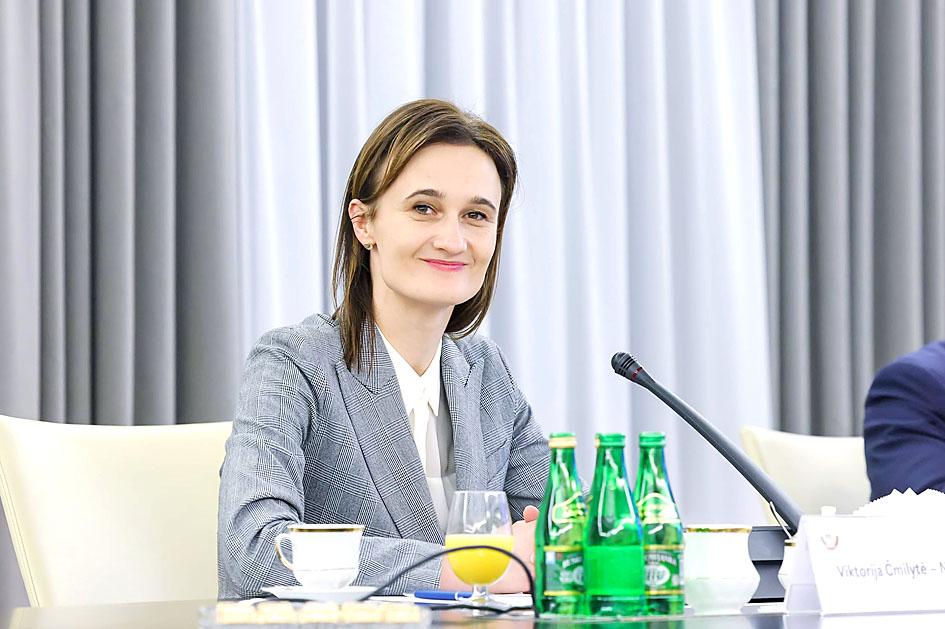Lithuanian President Gitanas Nauseda’s criticism on Tuesday of his country’s decision to allow Taipei to open a representative office in Vilnius using the name “Taiwanese” was a reflection of a domestic power struggle rather than a change in the Baltic state’s Taiwan policy, experts said.
Raigirdas Boruta, an associate expert at the Lithuanian think tank Eastern Europe Studies Centre, said that tense relations between Nauseda and Lithuanian Prime Minister Ingrida Simonyte had continued to heat up since the Cabinet led by Simonyte assumed office in December 2020.
“This recent statement by the president of Lithuania came as a surprise to many people in the country. Since the new Cabinet started its tenure, the Cabinet’s relationship with the president has been quite tense and complicated,” he said.

. Photo: screen grab from Facebook
“Recently, this friction has become more intense as the president is more vocal in his criticism towards the Simonyte government,” with Nauseda often saying he was rarely consulted on the Cabinet’s foreign policy-related decisions, Boruta said.
Marius Laurinavicius, a Lithuania-based expert on Russia, international affairs and security, agreed, saying that given the sensitivity of the cross-strait issue in the Baltic state, it is not unlikely that Nauseda was deliberately bringing up the topic to boost his own popularity.
Laurinavicius said that Nauseda’s remarks were “a very big foreign mistake.”

Photo: screen grab from Twitter
Bringing this ongoing political fight to the world stage would substantially weaken Lithuania’s international position, he added.
In Taipei, Marcin Jerzewski, a Polish research fellow at local think tank Taiwan NextGen Foundation, where he leads the New Southbound Policy research program, said that in the Lithuanian political system, the president is the head of state, and oversees foreign and security policy.
The prime minister, appointed by the president, is the head of government and is responsible for domestic affairs.
However, in practice, the duties of the president and prime minister are somewhat murky, he added.
Nauseda’s comments are not unusual within the context of Lithuania’s semi-presidential democracy, where conflicts between prime ministers and presidents are common.
Nauseda and Simonyte are political opponents and squared off in the second round of Lithuania’s 2019 presidential election, Jerzewski added.
“Ultimately, the reorientation of Vilnius’ China policy is a project of the ruling coalition, which took office a year ago,” while the public remains wary of the actual effects of the diplomatic row, he said.
Consequently, comments about Lithuania backing down from supporting Taiwan are “nugatory,” he said.
Nauseda said during a radio interview on Tuesday that there was nothing wrong with agreeing to the establishment of a Taiwanese office in Vilnius in November, but the problem was the official name — the Taiwanese Representative Office in Lithuania.
“The name of the office became a key factor that now has a very strong impact on our relations with China,” he said in the interview with Ziniu Radijas.
“I believe the name was the spark, and now we have to deal with the consequences,” he added.
Asked if Nauseda’s comments could mean the Lithuanian government might ask the Taiwanese office to change its name, Boruta and Laurinavicius said it was unlikely.
Nauseda’s controversial comments had elevated a domestic argument onto the international stage and was not in the national interests of the Baltic state, Laurinavicius said.
Forcing the Taiwanese office to change its name would not generate any benefits for Lithuania from China, but would only hurt its relations with the US, he added.
Asked to comment on Nauseda’s remarks, the Lithuanian Ministry of Foreign Affairs said it had no comment for the time being.
Representative to Lithuania Eric Huang (黃鈞耀) said his office had so far not been asked by the host country to change its name.
Ministry of Foreign Affairs spokeswoman Joanne Ou (歐江安) on Tuesday said that the ministry had noted Nauseda’s remarks in the interview, but did not wish to comment on the foreign policy of another country.
Taiwan will continue to support Lithuania amid the pressure it has encountered from China on all fronts simply because it allowed the opening of the representative office under the name “Taiwanese,” she added.
Taiwan’s representative offices in other countries with which it does not have official diplomatic relations usually use “Taipei” in their official names.
Beijing has sought to impose a cost on Lithuania for its decision, which it sees as implying Taiwan’s formal independence.
China’s recent retaliatory actions have included recalling its ambassador to Lithuania and expelling the Lithuanian ambassador from Beijing, as well as suspending direct freight train services to the Baltic state and banning Lithuanian products.

POSITIVE DEVELOPMENT: Japan and the US are expected to hold in-depth discussions on Taiwan-related issues during the meeting next month, Japanese sources said The holding of a Japan-US leaders’ meeting ahead of US President Donald Trump’s visit to China is positive news for Taiwan, former Japan-Taiwan Exchange Association representative Hiroyasu Izumi said yesterday. After the Liberal Democratic Party’s landslide victory in Japan’s House of Representatives election, Japanese Prime Minister Sanae Takaichi is scheduled to visit the US next month, where she is to meet with Trump ahead of the US president’s planned visit to China from March 31 to April 2 for a meeting with Chinese President Xi Jinping (習近平). Japan and the US are expected to hold in-depth discussions on Taiwan-related issues during the

‘LIKE-MINDED PARTNER’: Tako van Popta said it would be inappropriate to delay signing the deal with Taiwan because of China, adding he would promote the issue Canadian senators have stressed Taiwan’s importance for international trade and expressed enthusiasm for ensuring the Taiwan-Canada trade cooperation framework agreement is implemented this year. Representative to Canada Harry Tseng (曾厚仁) in an interview with the Central News Agency (CNA) said he was increasingly uneasy about Ottawa’s delays in signing the agreement, especially as Ottawa has warmed toward Beijing. There are “no negotiations left. Not only [is it] initialed, we have three versions of the text ready: English, French and Mandarin,” Tseng said. “That tells you how close we are to the final signature.” Tseng said that he hoped Canadian Prime Minister Mark Carney

President William Lai (賴清德) yesterday bestowed one of Taiwan’s highest honors on Saint Vincent and the Grenadines (SVG) Ambassador Andrea Clare Bowman in recognition of her contributions to bilateral ties. “By conferring the Order of Brilliant Star with Grand Cordon on Ambassador Bowman today, I want to sincerely thank her, on behalf of the Taiwanese people, for her outstanding contribution to deepening diplomatic ties between Taiwan and SVG,” Lai said at a ceremony held at the Presidential Office in Taipei. He noted that Bowman became SVG’s first ambassador to Taiwan in 2019 and

A man walks past elementary school artworks at the Taipei Lantern Festival in Ximen District yesterday, the first day of the event. The festival is to run from 5pm to 10pm through March 15.